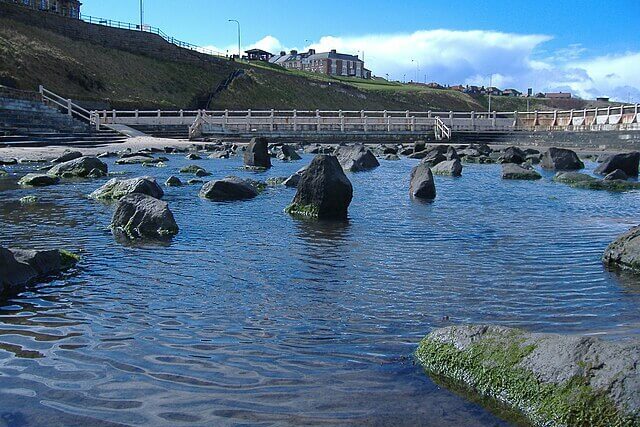
Scientists from Bournemouth University have celebrated the success of artificial rockpools in Bournemouth and the Isle of Wight, which have attracted various marine creatures.
The researchers installed 114 sink-shaped artificial rockpools across three locations in 2020 and have been monitoring the species that have made use of them. The results have been promising, with 65 different species found in the artificial rockpools on a seawall at Sandbanks, including the protected native oyster Ostrea edulis, compared to 40 species in the natural cracks and crevices of the harbour wall.
“As our coastlines become more developed, marine species are seeing their natural habitats replaced by sea defences which are harder to colonise,” said Jess Bone, a PhD researcher at Bournemouth University. “Sea level rise is also compounding the problem and is squeezing their habitats into smaller and smaller spaces. We wanted to see if giving them more rockpools could offer them a lifeline in the face of these challenges.”
Artificial rockpools serve as important habitats for small sea creatures, as they retain water during low tide and provide shelter and food, making them ideal nurseries for fish. These rockpools also offer safety to mobile species like fish and prawns, allowing them to remain submerged when the tide recedes. Even bass, an important species for the local fishing industry, were observed investigating the rockpools during high tide.
The scientists behind the project hope that the success of these artificial rockpools will inspire the creation of more in the future, contributing to the survival of marine life in developed coastal areas. By incorporating false crevices into sea defences and other human-made coastline developments, habitats for various sea creatures, including crabs, barnacles, molluscs, small fish, sea squirts, and seaweed, can be established.
“At low tide, we found that the rock pools provided a haven for squishy species, like sea squirts and sponges, that would dry out on the seawall and not survive,” explained Bone. “Similarly, they helped delicate species, like bryozoans and some finer seaweeds, that would get bashed about by waves on the seawall and would not survive either.”
“This project has shown how rockpools can help us to ensure nature can continue to survive in urban coastal spaces. They also give residents a chance to connect with nature, learning more about the wealth of wildlife just off the harbour’s edge and the role it plays in preserving our natural environment,” Bone said.
——————————————————————————
At Natural World Fund, we are passionate about stopping the decline in our wildlife.
The declines in our wildlife is shocking and frightening. Without much more support, many of the animals we know and love will continue in their declines towards extinction.
When you help to restore a patch of degraded land through rewilding to forests, meadows, or wetlands, you have a massive impact on the biodiversity at a local level. You give animals a home and food that they otherwise would not have had, and it has a positive snowball effect for the food chain.
We are convinced that this is much better for the UK than growing lots of fast-growing coniferous trees, solely to remove carbon, that don’t actually help our animals to thrive.
This is why we stand for restoring nature in the UK through responsible rewilding. For us, it is the right thing to do. Let’s do what’s right for nature!
Support our work today at https://naturalworldfund.com/ and join in the solution!

